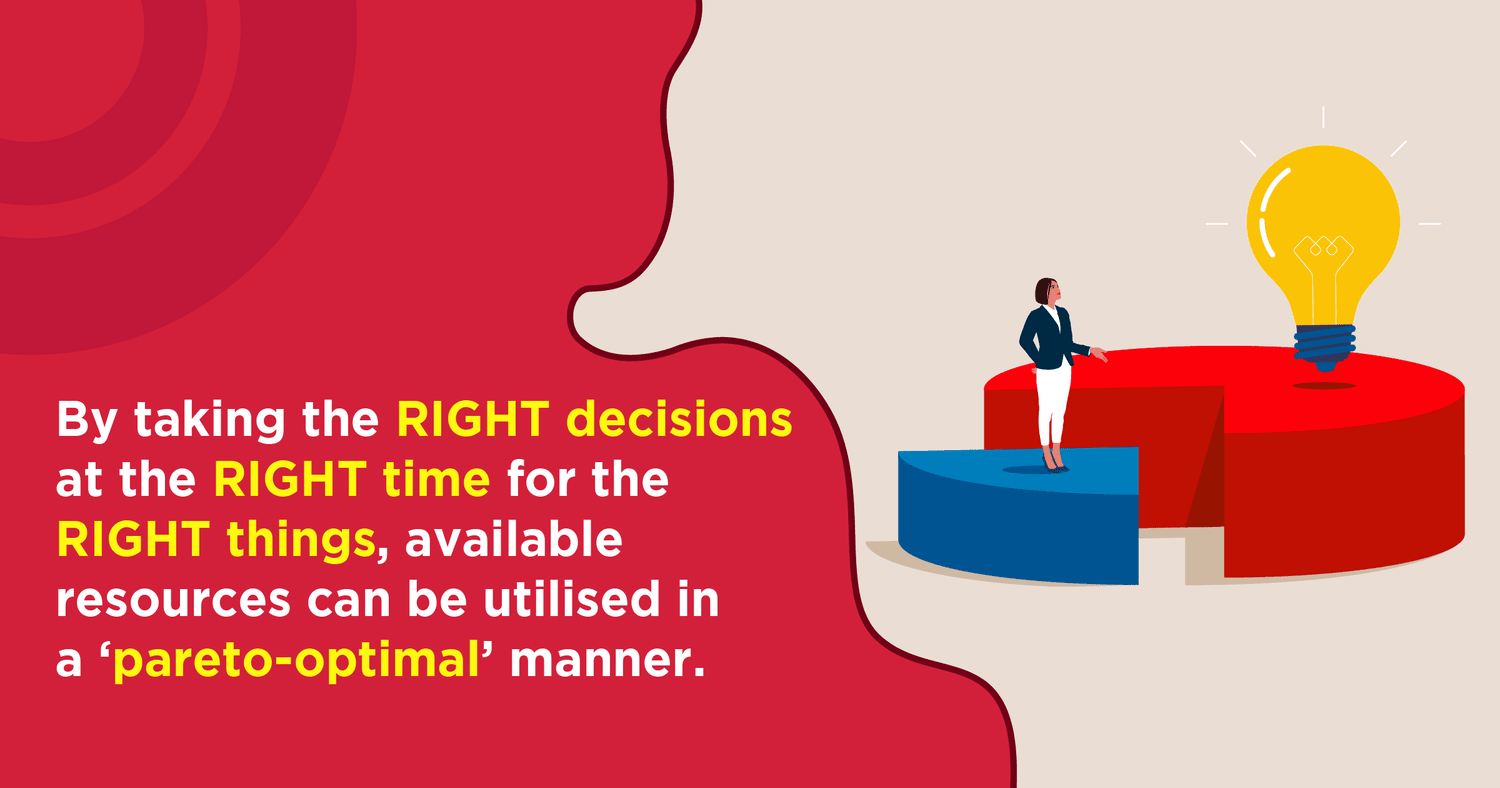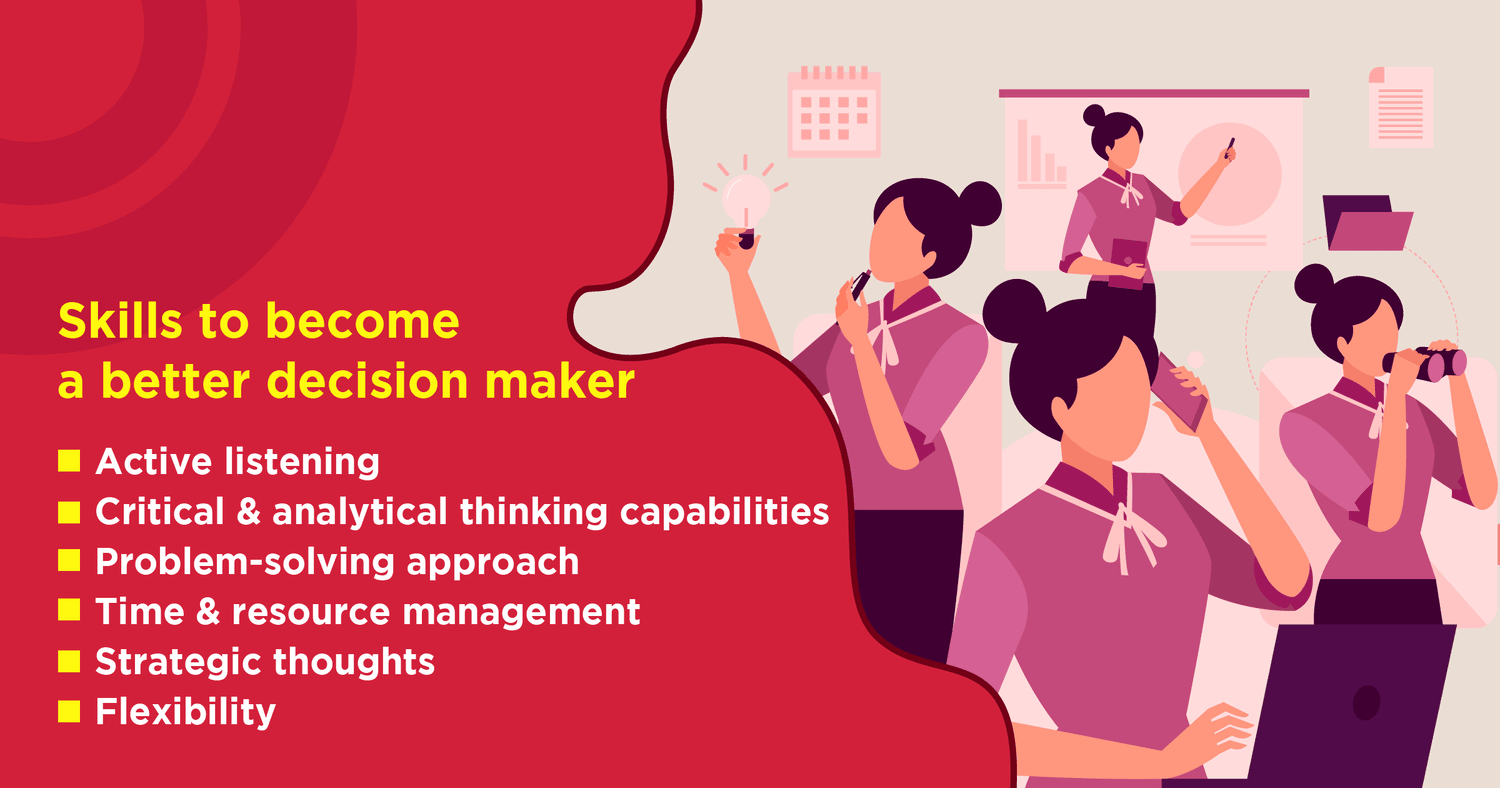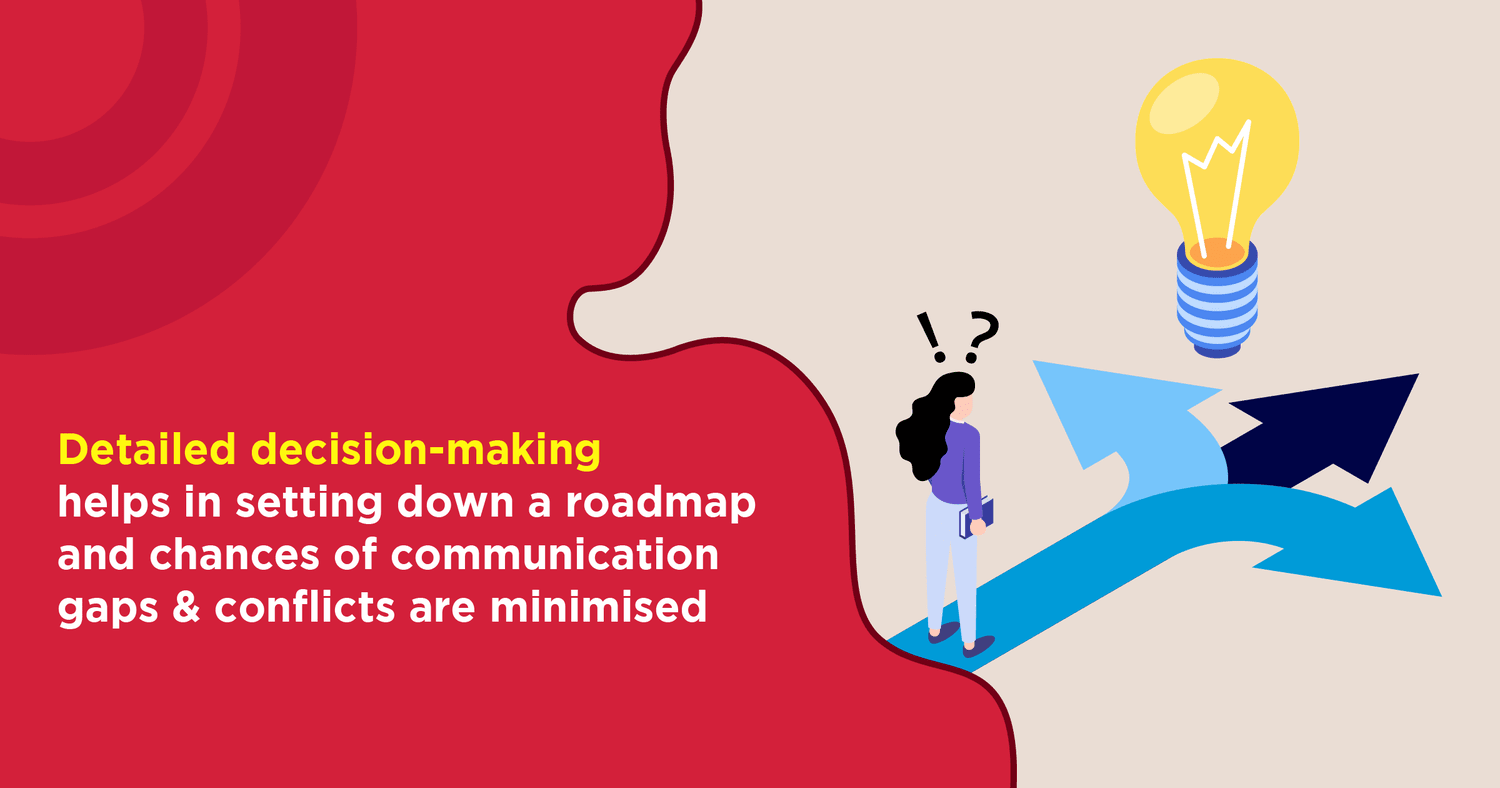Effective Decision Making – Key To Success

“Decision is a sharp knife that cuts clean and straight; indecision, a dull one that hacks and tears and leaves ragged edges behind it.”
Gordon Graham
To make a mark both professionally and personally, the importance of prompt, well-thought and effective decision-making simply cannot be overemphasised. The ability to take the RIGHT decision(s) at the RIGHT time(s) is instrumental in helping individuals make mindful choices – which proves beneficial for themselves as well as their workplaces/families. A combination of behavioural and cognitive skills are essential for a person to become a good decision-maker. Let us here take a look at how effective decision-making can help you at your workplace, and how you can master this trait:
What Exactly Is Decision-Making All About?
Arriving at a decision is all about making ‘informed choices’ on the basis of available data, and careful assessment of alternative solutions/alternatives. The need for decision-making stems from the urgency to react to an opportunity, counter a possible threat, or resolve a particular problem. From one perspective, decision-making is comparable to taking a call at the crossroads. The direction of travel has to be chosen, so that the journey ahead is smooth enough.
At this stage, it is also important to understand the key processes of effective decision-making. Broadly speaking, these are:
-
Getting full clarity regarding the objectives of taking the decision.
-
Collecting all pertinent details, which would help in ensuring that the decision-making is more informed.
-
Considering all possible alternatives.
-
Encouraging participation/collaboration from all relevant stakeholders (team-members, managers, C-level executives, etc.).
-
Arriving at the decision.
Decision-Making: A Major Influencing Factor At Workplaces
From day-to-day operations (‘micro-scenarios’) to overall organisational direction & leadership (‘macro-scenarios’) – practically all important workplace variables are influenced by the quality of decision-making. This includes the decisions taken by the employees as well as the management. Here’s an overview of what factors are impacted by decision-making:
When any employee has reasons to believe that the decisions taken by his/her superiors (or the management) is not up to the mark, engagement, motivation and job-satisfaction levels go for a toss. Good decision-making, on a consistent basis, builds TRUST. Decision Making is Directly Proportional with Resource Utilization
By taking the RIGHT decisions at the RIGHT time for the RIGHT things, available resources can be utilised in an efficient, ‘pareto-optimal’ manner. When the person(s) in charge lack decision-making skills, costs can escalate, and there can be resource-wastage. Every organisation wishes to create a culture of security, commitment and positivity. Once again, this is only possible when the decision-making standards (by the management AND by individual employees) are constantly high. The quality of decision-making is inversely proportional to the risks of miscommunication, lack of team collaboration, time/resource wastage, and lost productivity. Stronger, better decisions pave the way for easy achievement of goals & objectives. When decisions are taken after carefully weighing all the nitty-gritties, they directly make the growth path of organisations smoother. In fact, smart decision-making is the lifeline of company growth over time. Like any good thing in life, the best decisions – be it in a personal or professional context – do not happen by chance. There are specific steps that need to be followed. We will highlight them here: STEP 1: Identify the problem and define the nature/form of decision that has to be taken. STEP 2: Gather all the information that is relevant to the decision-making task on hand. This step can include both self/internal research and asking for external resources. STEP 3: Consider all the alternative courses of action, and collect evidence on their effectiveness. This is, in essence, a modeling exercise that helps in funneling out the ineffective options. STEP 4: Now that all preparatory stages are complete, it’s time to take decisive action. In other words, after evaluating everything, the decision has to be properly implemented. STEP 5: Once some time has passed after taking a decision, review its effects. Find out if the desired impact has happened, or whether course-correction(s) are necessary. Inability to take decisions is just like one of these viruses which seem inconsequential at first – but end up as a serious malady. A person who is a poor decision-maker often fails to understand & evaluate the situation correctly, while processing/interpreting the information available also becomes a challenge. As a result, sub-optimal decisions are taken, which can easily turn out to be counterproductive. Note: According to a recent Gartner report, poor decisions can eat up ~4% of the profit figures of an organisation. Listening and Analytical Skills are Major that Helps in Decision Making Just as tasty food needs the best ingredients, decision-making also requires a combination of several vital cognitive & behavioural skills. From active listening, critical & analytical thinking capabilities, and a problem-solving approach, to time & resource management, strategic thoughts, and flexibility – all of these skills need to be nurtured, in order to become a good decision-maker. Once you master these skills, you will be able to address work-related concerns effectively, and attain your objectives. It is easy to feel overwhelmed by a decision-making task that involves multiple possible courses of action. Learn how to narrow down these ‘choices’, and eliminate the impractical/unrealistic ones. Having to choose 1 option from 3 is easier than picking from a pool of 10 options. People who are ‘more informed’ are automatically the better decision-makers. Practice the skill of research, to gather information on all facets of a particular matter – so that the decision is based on actual data. Better information also helps in easier identification of the underlying issue(s). Decisions vary in terms of importance, and the time you need to dedicate for them. Categorise these tasks according to their urgency – and prioritise things accordingly. Arriving at the right decisions involves a lot of cost-benefit analyses. Factor in all the pros and cons of the different decision options, and select the action that offers the most comparative advantages. While gut-feeling is valuable, being emotionally attached with a decision is never a good idea. Such attachments, or a tendency to act impulsively, easily lead to biased (and incorrect) decisions being taken. Decision Making Skills Lead You to the Way of Leadership Good decision-making capabilities can also go a long way in helping individuals sharpen their leadership skills. With the help of smart, well-crafted decisions, strategies to handle emergencies can be formed, workplace productivity levels can be enhanced, and the trust-factor with employees can be progressively improved. Since detailed decision-making helps in setting down a roadmap (and clear expectations from people), chances of communication gaps & conflicts are minimised. Unlike what is often thought, decision-making is not a domain that is exclusive to only the senior leaders at the workplace. The onus lies on each team-member to contribute towards the overall growth of the organisation through the actions they take. So, why is effective decision-making so important? Let’s take a look: Good decision-making skills reflect better organisation of work. This, in turn, pulls up individual/collaborative performance and productivity. By helping in optimal utilisation of money, time, people and other resources, timely & data-backed decisions boost the bottom line of businesses. While most business strategies do have an element of risks about them, these can also be minimised through expert decision-making. Carefully taken decisions eliminate mistakes, oversights and liabilities from the system. When decisions are taken after considering the interests of everyone, employee trust & satisfaction levels go up. As job-satisfaction improves, respect & engagements are boosted – and the best results are obtained. Note: By helping people understand situations and optimise their work ethic, smart decision-making also helps in superior time-management. In both professional and personal spaces, there are many ‘variables’ that go a long way in determining future courses of action, success and even peace of mind. Effective decision-making, at the end of the day, boils down to how these so-called variables are managed. Having the ability to calmly weigh all the factors at play, interpret all information, consider all pros & cons, and arrive at sound decision(s) accordingly helps a person ensure personal growth – and usher in success, both personally and professionally. Given the importance of decision-making, it’s hardly surprising that it has emerged as one of the most sought-after core competencies in any individual. Procrastination is the biggest enemy in the path of success at the workplace, leading to lost opportunities and inefficiencies. When you are a good decision-maker, you can eliminate these hurdles…with ease! Vandana is a Human Resources Manager at Brandwizz. She Heads Talent Management at Brandwizz. Apart from work, she loves reading and listening to music.

Effective Decision-Making: The Most Important Steps
Understanding The Risks Of Poor Decision-Making
What Skills Do You Need To Ace For Becoming A Better Decision-Maker?

Tips To Become An Excellent Decision-Maker
Work With A Direction; Consider Only Meaningful Alternatives
Constantly Improve Your Research and Information-Gathering Skills
Prioritise Each Decision-Making Task
Consider The Upsides and Downsides
Avoid Impulsiveness; Do Not Act On Emotions
Effective Decision-Making: A Key Element For Good Leadership

Biggest Advantages Of Expert Decision-Making





